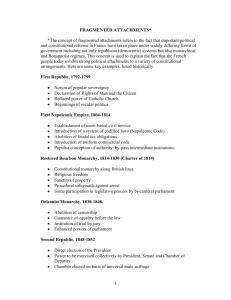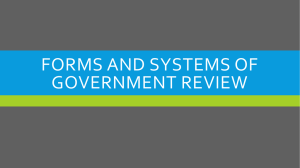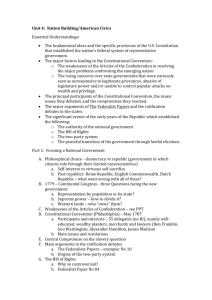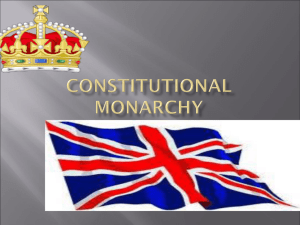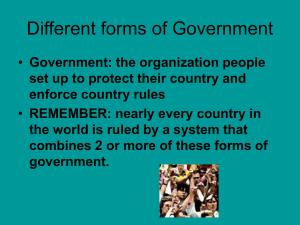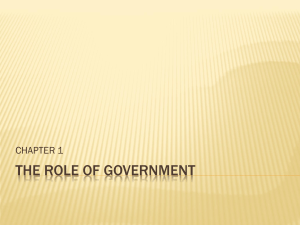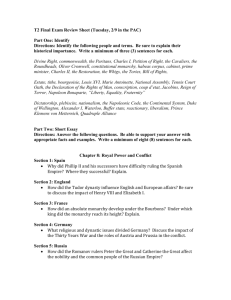France - People Server at UNCW
advertisement
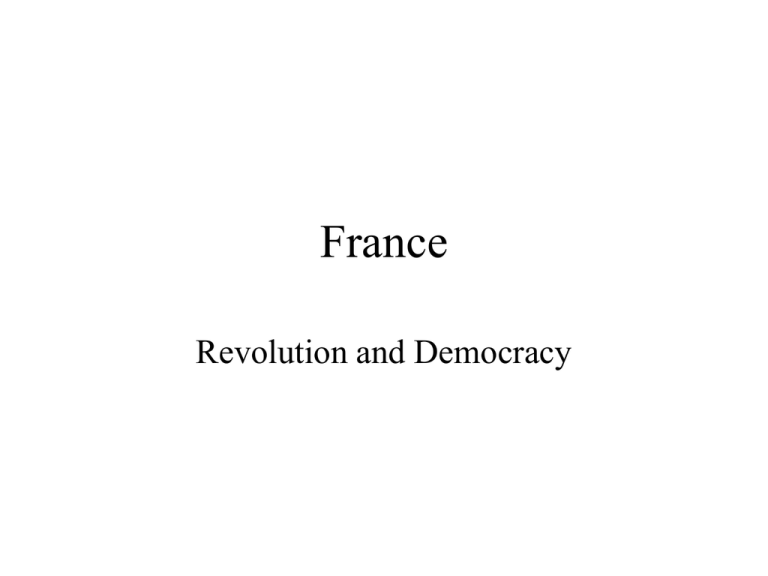
France Revolution and Democracy France • Population 62.3 million • President Nicholas Sarkozy (Union for a Popular Movement) • Prime Minister Francois Fillon • Religion: 73% R.C., 1.3% Jewish, 1.7% Protestant, 8-9.6% (5-6 million) Muslims* • Practice for all groups is down • Ethnic groups: Celtic and Latin with Teutonic, Slavic, North African, SubSaharan African, Indochinese, and Basque minorities • Current constitution since 1958 • http://news.bbc.co.uk/2/hi/europe/coun try_profiles/998481.stm#leaders *French government estimates Chronology of Events 1789-91 Constitutional Monarchy – First Republic – Statist tradition: state bureaucracy, govt administered separately from crown • • • • • 1789 Bastille Day – collapse of absolute monarchy 1790 Nobility abolished 1791 establishment of constitutional monarchy 1792 civil wars begin 1793 Louis 16th killed – Multiple attempts at government - failure • 1794 The Terror ends • 1799 Napoleon seizes power Chronology of Events • 1814 European alliance moving into Europe – first Napoleonic abdication; Louis 18th restored to throne. • 1815 Napoleon escapes Elba – battle of Waterloo • Restoration of monarchy • 1830 Louis Philippe replaces last Bourbon on throne • 1848-52 Second Republic est. in Paris Revolution – Characterized by conflict, unable to govern • 1852 – 1870 Second Empire – Napoleon III crowned (nephew of Napoleon) – 1870 defeat in Franco-Prussian War leads to revolution – 1871 Napoleon defeated, Third Republic declared Constitutional Change: The Republics • Bonaparte overthrown by coalition of European powers and the Bourbon monarchy was restored. • Monarchy continues until 1848 when citizens revolt. • The Second Republic (1848-1852) is declared. – – – – Universal male suffrage Class conflict Republican government ineffective Napoleon’s nephew rises to power (1852-1870) • Dictatorial rule brings brief stability Constitutional Change: The Republics 1871 Third Republic emerges – Competing groups develop constitution (monarchists and republicans) – democracy – Endures through world war one (Maginot Line) until German occupation, 1940 • German Occupation – Northern zone occupied by Nazis – Southern zone governed by sympathetic French • Vichy regime, Marshall Petain 1940-44 • Charles de Gaulle – Leader of resistance movement Constitutional Change: The Republics • World War II • France militarily defeated by Germany • Partitioned by Nazis into a northern and a southern zone • Northern zone under direct occupation • Southern zone, a sympathetic government formed and based in Vichy, France – Leader was Marshall Petain – Dictatorship (1940-44) Constitutional Change: The Republics • German forces forced from France in 1944 • Charles de Gaulle leads the provisional government and begins work for democratic transition. • 1946 de Gaulle resigns • 1946 the Fourth Republic established – During the 12 years of the Fourth Republic there were 24 governments. Modern France: The Fourth Republic • Weak constitutional structure plus election rules allowed multiple parties to compete in the legislature • Parties were unable to garner electoral majorities • Fourth Republic governments were coalition governments within a society characterized by cleavage and conflict • National and International tensions from the Cold War, Indochina, and independence movements in colonial holdings such as Algeria. • 1958 French political leaders asked de Gaulle to return to the leadership of France The Fifth Republic 1958-? • Enacted by referendum in 1958 • Combination presidential/prime ministerial style of government. • Presidency was moved from mostly ceremonial role to a political position constitutionally above the legislature. • President would be the symbol of national unity • Powers include: submit legislation for referendum, ability to dissolve parliament and call for new elections, emergency powers. Executive • Dual Executive: President and Prime Minister • President: “Guardian of the constitution” • Direct popular vote (term was 7 years; in 2000 changed to 5 year terms with two term limit) • Prime Minister presides over government – Support from majority of deputies in National Assembly (propose PM to the president) – Appointed by the President – Government operation (Cabinet – Council of Ministers) resembled U.S. Cabinet – More than 1st among equals • President is actual head of the political system • Cohabitation (1986-88, 1993-95, 1997-03). Legislature • Bicameral – Strict rules on individuals and the Parliament • National Assembly (577) – Direct election , single member districts, 5 year terms – May be dissolved by President (once yearly) – Enacts laws within a strictly defined domain (defined by the executive) – Committee system: 6 large standing committees to prevent specialization (domination) – check of executive – Motion of censure passed by 50 +1 (majority) of members can cause the government to fail (dismissal). Legislature • Senate (321) – 304 elected by electoral college, of elected officials from each department, 5 from the dependencies, 12 from the French Assembly of French Citizens Living Abroad; 6 year terms. • Shares (but is subordinate to) legislative functions with the National Assembly – May initiate legislation, must consider all legislation adopted by N.A. – reconciliation committee appointed by government – If unable to resolve differences N.A. may reconsider the legislation and take a final vote The Judiciary • Until the Fifth Republic, France had no judicial check on the constitutionality of the actions of its political authorities. • Constitutional Council – Constitutional disputes – 9 members, single 9 year term, appointed by president, heads of NA and Senate – Empowered to rule on any constitutional matter but has restrained itself – more activist in 2000s Electoral System • 2 ballot system within single member districts taking place on successive Sundays. • Candidates receiving 50% or more can win. Second round is achieved by winning 12.5% of vote in first round. At second round candidate with most votes elected. • Presidential election – run off model: • http://en.wikipedia.org/wiki/President_of_the_Fre nch_Republic#Election • http://www.ipu.org/parline/reports/2114_arc.htm Associational Groups • Tend to be weak • Not a lot of formal interest group activity. • A result of the 1789 revolution abolishing the ancien regime and the guild system (closed craft networks, entrance via long apprenticeship, members had monopoly priviliges…this was viewed in the revolution as an impediment to liberty). • France is a plural system but not in the same manner or to the extent of other western democracies (patchy development, tendency to be low key). Background to Anti-clericalism • The Dreyfus affair • Jewish military officer wrongly accused and convicted of treason • Long fight between church officials, military and political conservatives eventually resolved the problem • result was a strong separation between church and state. Ideology and Parties in France • Strong leftist overtones inherited from the Resistance movement – Socialist party (Lionel Jospin – PM 1997-2002) – Communist party – Green party • Presence of strong conservative, nationalistic groups. – Gaullist party (nationalistic/anti-communist) – Chirac (president 1995-) • Small factions of ideological right wing, fascist groups. – National Front (immigration) – Le Pen (defeats Jospin in first round 2002), fascist • Center groups – Rally for the Republic, French Social Party, Popular Republican Party, Union for French Democracy, and others. – Center groups (smaller parties) have pattern of alliance with right groups. – These alliances have formed the bedrock of French political system. Other issues • 2002 France adopts the Euro (French franc) • 2005 minority conflict • 2007 Nicholas Sarkozy elected president Web Sites • The Prime Minister’s Official Web Site: http://www.premier-ministre.gouv.fr/en/ • 1958 Constitution: http://www.premierministre.gouv.fr/en/p.cfm?ref=27868 • Events of October 27th, 2005 http://abcnews.go.com/International/wireSt ory?id=1285833
